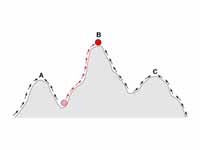Binge Eating Disorder Treatment and Recovery
We all eat too much from time to time. Let’s take the Thanksgiving holiday as an example; the turkey, sides, all of those pies, the stress of preparing the meal or seeing your family, and oh the sweet relief of that delicious pumpkin pie! Millions of Americans nationwide consider it a day where you are supposed to binge on food. Over-eating on Thanksgiving is as normal an accepted American tradition as baseball and apple pie. We even promote these types of bingeing behaviors with comedic television ads about taking antacids with you this year to your holiday celebrations- or giving them as gifts. In fact the holiday season sanctions bingeing as just normal, expected behavior and quite frankly unavoidable.
So when does binge eating cross the line into disordered eating for an individual and what exactly does that mean? Angela Harmon Co-Founder of Woodleaf Eating Disorder Center in San Francisco, CA says the line into disordered eating is important to define: “Now more than ever we are seeing education about binge eating disorder come to the forefront in literature and the media, sufferers are finally able to each out for the help they have needed for years.” In a culture that fixates itself on dieting and body perfection many binge eaters don’t know where to turn for support. “Many binge eating sufferers turn to diets for relief and this just perpetuates the viscous bingeing cycle. It is time we stop labeling “over-eating” as a lack of control or a “choice” and identify it for the eating disorder that it truly is” says Harmon “Dieting creates a viscous cycle of weight loss, weight gain and ultimately results in binge eating disorder becoming more severe.”
To understand binge eating more fully its helps to take a look at “normal” or “healthy” eating. In normal healthy eating patterns there is a natural ebb and flow in food intake. Sometimes we eat until we are full, sometimes we eat what we crave and from time to time we may eat too much or even too little. This variation in food intake is not a problem as long as a majority of the time we each in a balanced way. In healthy eating we do not obsess about food and instead listen to our natural body signals of hunger and fullness. While we may not follow this signals perfectly we generally eat when we are hungry and stop eating when we are full. Within the bounds of normal healthy eating Thanksgiving comes and we may over-eat with small regret or a stomach-ache but that day passes and life (and eating) go back to normal. For those who suffer from binge eating disorder how-ever over-eating takes on an entirely different meaning and experience.
While binge eating disorder is a relatively recently recognized eating disorder (often referred to as compulsive over-eating) what sets it apart from normal eating patterns is the distress and lack of control one feels regarding the bingeing. In essence bingeing and compulsive over-eating becomes disruptive to a persons life. Full and hungry signals become mixed or not detectable at all and a sufferer may feel “hungry” all of the time. Bingeing on salty or sugary food may also set the body up for cravings and binges leads to more binges. Eventually the sufferer begins to feel out of control of the binges all together and a feeling of hopelessness sets in.
Binge eating disorder is thought to be one of the most common typed of eating disorders affecting millions of Americans. While similar to Bulimia Nervosa those who suffer from it do not purge (i.e. vomiting, laxative, excessive exercise, etc) their bodies of the food they consume during a binge episode. Other symptoms of binge eating disorder include the following:
Binge Eating Disorder
• Recurrent episodes of binge eating. An episode is characterized by: 1. Eating a larger amount of food than normal during a short period of time
(within any two hour period) 2. Lack of control over eating during the binge episode (i.e. the feeling that one cannot stop eating).
•Binge eating episodes are associated with three or more of the following:
1. Eating until feeling uncomfortably full
2. Eating large amounts of food when not physically hungry
3. Eating much more rapidly than normal
4. Eating alone because you are embarrassed by how much you're eating
5. Feeling disgusted, depressed, or guilty after overeating
• Marked distress regarding binge eating is present
• Binge eating occurs, on average, at least 2 days a week for six months
• The binge eating is not associated with the regular use of inappropriate
compensatory behavior (i.e. purging, excessive exercise, etc.) and does not
occur exclusively during the course of bulimia Nervosa or anorexia Nervosa.
If you are one of the millions of American’s estimated to suffer from Binge Eating Disorder you are not alone. Harmon reports seeing an increase in clients seeking binge eating disorder treatment: “As more information and education come to light about this painful disorder sufferers are reaching out for help. It is wonderful to see the relief clients feel when they realize they are not crazy or defective but in fact have a treatable eating disorder.” Growing evidence in psychological research is showing that binge eating disorder can be just life impairing as anorexia and bulimia. The good news is that recovery from binge eating disorder is possible and its treatment can often be covered by insurance. Getting support and treatment for binge eating is of particular importance because of the isolation it brings. Breaking out of this isolation and getting support from others is vital to recovery.
While recovery from Binge Eating Disorder takes time Harmon sees that it is 100% possible. “I have seen clients fully recovery from this disorder after decades of the diet rollarcoaster" I have seen them change their relationship with food and themselves and it is an amazing process to be a part of.” For those who suffer from binge eating disorder this is very, very good news. With research, education and options for recovery are increasing every day recovery from binge eating disorder is now truly possible.
-
Losing Weight After Pregnancy: How To Stay Motivated
It is every womans wish to lose all the
-
All Men Should Avoid This Diet…
Most doctors will tell you to avoid unhealthy crash diets. It’s
-
How I Lost 12 Lbs of Pure Fat In 2 Weeks And Kept It Off
About 1 year ago I was at my all time high, for my weight. I had a chu
-
This Will Speed Up Your Metabolism…A Lot!
True or false: you can burn calories while you sleep. T
-
How To Get A Flat Stomach
The first secret to getting a flat stomach is NOT to do a ton of crunc
-
Fat Burning Furnace Review – A Few Things You Need To Know About Eliminating Every Ounce Of Unsightly Fat
Reading a Fat Burning Furnace review is very important especially if y
- DON'T MISS
- Easy Weight Loss Diets
- Weightlifting Workouts Help You Gain Weight
- Myths About Your Weight Loss Goals
- 6 Ways To Benefit From Reading Weight Loss Surgery Reviews
- Why Birth Announcements Should Be Sent
- How dieting can help you lose weight
- The Advantages Of Weight Loss Training Program For A Healthy Lifestyle
- Ditch the Diet - Choose Health Today!
- Is Snoring Interfering With Your Rest? Read These Tips.
- Weight Loss Surgery, Is It A Safe Option?




